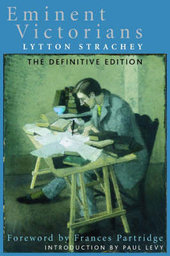
|
Eminent Victorians
Paperback
Main Details
| Title |
Eminent Victorians
|
| Authors and Contributors |
By (author) Lytton Strachey
|
| Physical Properties |
| Format:Paperback | | Pages:360 | | Dimensions(mm): Height 234,Width 156 |
|
| Category/Genre | Biographies: Historical, Political and Military
British and Irish History
World history - c 1750 to c 1900 |
|---|
| ISBN/Barcode |
9780826464972
|
| Classifications | Dewey:941.0810922 |
|---|
| Audience | | Tertiary Education (US: College) | | Professional & Vocational | |
|---|
| Edition |
New edition
|
| Illustrations |
Illustrations
|
|
Publishing Details |
| Publisher |
Continuum International Publishing Group Ltd.
|
| Imprint |
Continuum International Publishing Group Ltd.
|
| Publication Date |
27 March 2003 |
| Publication Country |
United Kingdom
|
Description
The biographer and essayist Lytton Strachey died in 1932. Here, to mark the seventieth anniversary of his death, is the first critical edition of his most famous work, Eminent Victorians. Originally published in 1918, the book was an immediate bestseller and became a pioneering work in the writing of modern biography. Eminent Victorians was an assault on the Victorian Age and its values. Choosing four key figures as pivotal representatives of their time - Cardinal Manning, Florence Nightingale, Dr Arnold of Rugby, and General Gordon - Strachey conducted a masterly hatchet job with wit, iconoclasm, and a satiric edge. The book was acclaimed as epoch-making, and was famously described by Cyril Connolly as 'a revolutionary textbook on bourgeois society written in the language though which the bourgeois ear could be lulled and beguiled, the Mandarin style'. For this new edition the text of Eminent Victorians is printed in its entirety, and there are also new critical afterwords by four experts, reassessing Strachey's judgements on his subjects and presenting each one in a fresh light. David Newsome writes on Cardinal Manning; Mark Bostridge on Florence Nightingale; Terence Copley on Dr Arnold; and John Pollock on General Gordon. Textual notes and illustrations from the original manuscript are included, together with previously unpublished photographs. Paul Levy, editor of Strachey's correspondence, writes the introduction, and the foreword is by the only remaining survivor of the Bloomsbury Group, Frances Partridge.
Author Biography
Giles Lytton Strachey (1880-1932) was educated at Trinity College, Cambridge. He then became an essayist and book reviewer. The publication of Eminent Victorians brought him success and made him famous. Other works include Queen Victoria and Portraits in Miniature.
ReviewsKirkus Review US:When Lytton Strachey published Eminent Victorians in 1918, he was taking a risk. A collection of essays effectively debunking the likes of Cardinal Manning, Florence Nightingale, Dr Thomas Arnold and General Gordon could and would attract vilification. Yet wasn't it a calculated risk? A country left cynical by war was only too ready to lap up the lampooning of four previously unimpeachable public figures, particularly in the case of Gordon, and the book was an immediate success. Strachey was far too intelligent not to know exactly what he was doing. Dismantling the standard sentimental reverence for Victorian icons, the genius of Strachey's approach lay in allowing his subjects enough rope to hang themselves; a technique which was to transform the art of biography from worthy admiration into a racy and highly subjective genre. Moreover, with Strachey deliberatively selective or manipulative of his material frequently to the point of invention or even blatant falsification, it is in a sense immaterial whether or not Dr Arnold really was a manic pedagogue, Florence Nightingale a sexually sublimated neurotic, Cardinal Manning a hypocrite driven by overweening ambition or General Gordon a drunken bigot. Subsequent, less mischievous commentators have provided more than adequate defences for Strachey's victims, as do the contributors of the afterwords in this sparkling new edition of his work, published to coincide with the 70th anniversary of his death. If Strachey left a gift to posterity, it was the licence to experiment. The forerunner of a modern journalistic trend which takes it as read that no great person is inviolable to demystification, he might have been writing for Private Eye, and doing so with all the wickedly revealing humour that provokes a laugh, and a wince, to this day. (Kirkus UK)
|